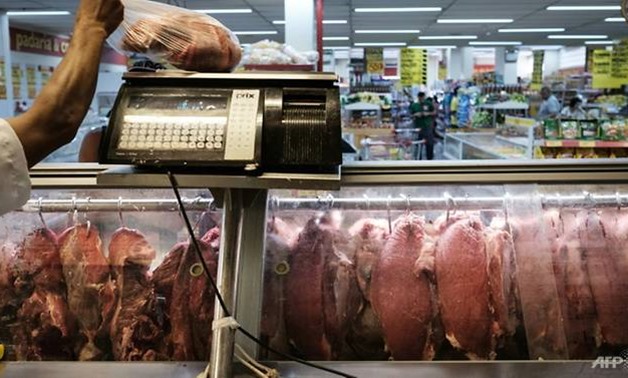
An employee sells meat during an inspection by Rio de Janeiro state's consumer protection agency, PROCON, at a supermarket in Rio de Janeiro, Brazil in March 2017. (Photo: AFP/Yasuyoshi Chiba)
Sao Paulo - 24 June 2017: Brazil's agriculture minister Blairo Maggi announced Friday he will travel to the United States to fight a ban on Brazilian beef imports, but the Latin American country's meat industry is already reeling.
"Brazil could lose a lot if it isn't able to get this decision reversed," Maggi announced in the wake of the US Department of Agriculture's announcement Thursday of a ban on imports of fresh Brazilian beef due to "recurring" food safety concerns.
Brazil is the world's leading beef and poultry exporter.
Officials spent Friday defending the quality of the country's beef, part of one of the economy's most important sectors.
"We know what we are doing and the federal inspection system is robust," the agriculture secretary, Eumar Novacki, told a press conference.
Although the United States imports only a sliver of Brazil's fresh beef exports, it is a prestigious market.
"In the short term, the scale of purchases by the United States is not that great but it sends a very important signal, telling other international buyers that there are problems," said Cesar de Castro Alves, an analyst at the MBAgro consultancy.
The image problem is especially acute since Brazil had just been getting over a major scandal in March when 21 meat processors were accused by Brazilian police of adulterating bad quality meat and bribing inspectors.
That prompted some 20 countries -- including chief beef markets China and Hong Kong -- to suspend all Brazilian meat imports. The bans caused havoc in the $13 billion a year industry, which employs some six million people, before being finally lifted.
The United States had imposed inspections on 100 percent of Brazilian meat imports since the March row, with US inspectors rejecting 11 percent of the products -- compared to one percent from other countries.
In Brazil, the US clampdown is seen as partly influenced by trade rivalries, as well as health concerns. The United States is the world's top beef producer.
"We do have a sanitation problem but also big pressure from US producers who don't want to see Brazilian beef there. We are major competitors on the world stage and we are selling them meat," Maggi said.
This comes on the back of a breakthrough for the United States in May when China authorized US beef imports for the first time in 13 years.
That may be coincidental, analysts say, but there's no question that Brazil's industry feels it's taking hits from several directions.
"The US (ban) decision threatens Brazilian farmers even more when they are facing a series of difficulties," the Confederation of Agriculture said.
At the eye of the turbulent Brazilian meat industry is the giant meatpacker JBS, which was caught up in the rotten meat and bribery scandal.
It has taken on an even higher profile after a top company executive accused President Michel Temer of corruption.
Temer was secretly recorded by the owner of JBS parent company J&F, Joesley Batista, allegedly agreeing to pay hush money to a politician.
The recording was handed over to prosecutors, who are pushing to bring Temer to trial, as part of a plea bargain over massive corruption by J&F.
Batista and his brother avoided jail but J&F must pay a record 10.3 billion reais (approximately $3 billion) in fines over 25 years.


Comments
Leave a Comment